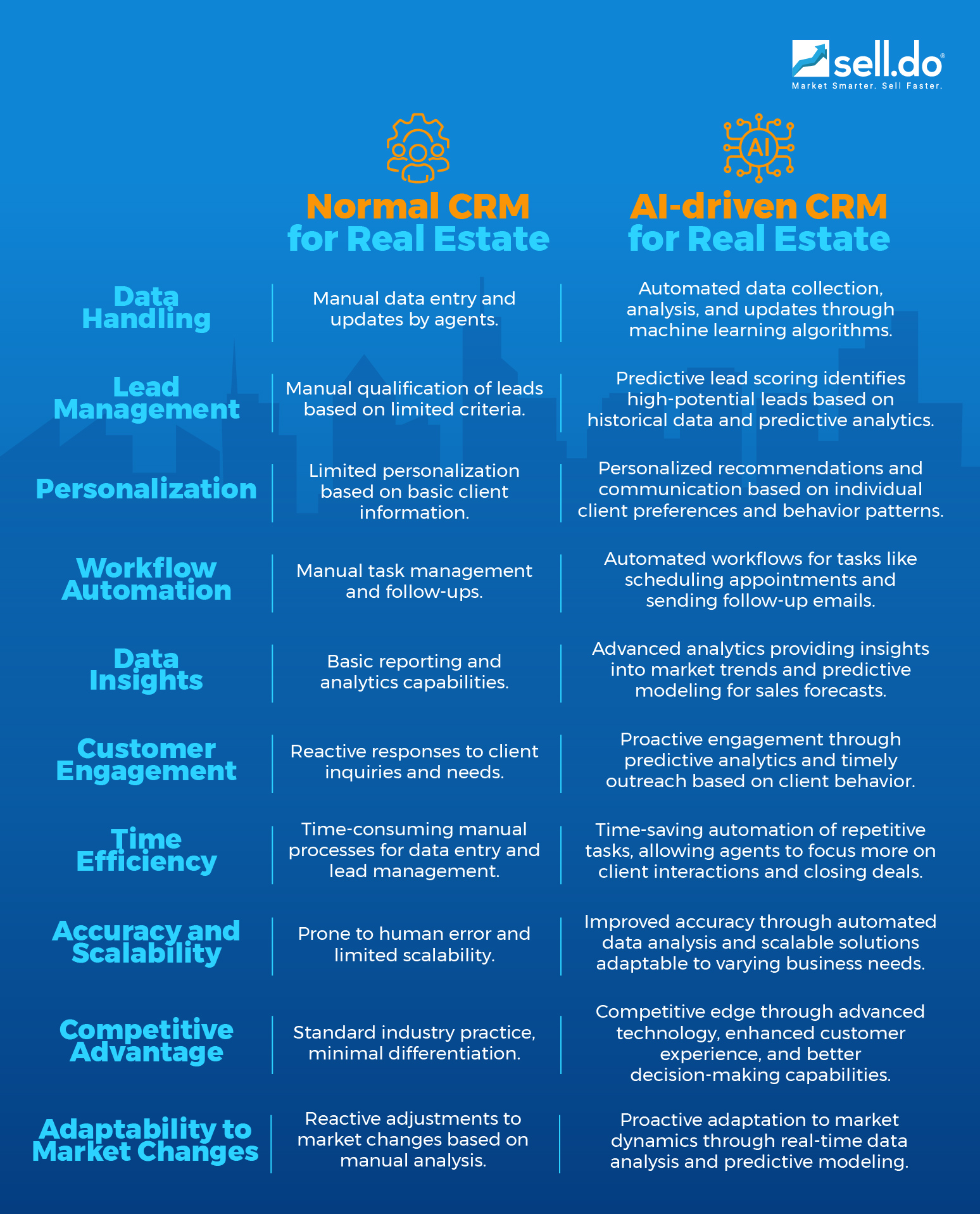In the realm of real estate, trends come and go, contributing to the industry's ever-changing nature. The current trend in this industry is the significant shift towards advanced technologies in order to enhance efficiency and boost sales. One noteworthy player in this shift is the growing importance of AI analytics. This new-age technology has become a game-changer in offering valuable insights and strategic advantages in the real estate industry.
AI analytics is like a tech-savvy upgrade, bringing in smart insights and making the whole system work more efficiently to save time and effort. Instead of just managing data, AI analytics scans into the trivial details, offering valuable insights from big sets of information.
With AI analytics, real estate CRM is becoming more strategic and innovative, shaping a new way of doing things in the world of real estate management.
Understanding AI Analytics in Real Estate CRM Software
AI analytics in real estate CRM software use intelligent algorithms to transform traditional systems. The tool is not just for managing the data but also for offering valuable insights and predictions from vast datasets.
-
AI Analytics: Know the Basics:
AI analytics in real estate CRM (Customer Relationship Management) systems is a significant evolution in how professionals operate within the real estate industry. This new-age technology plays an important role in enhancing decision-making processes, optimizing workflows, and elevating overall efficiency.
AI analytics, or artificial intelligence analytics in real estate, refers to the usage of intelligent algorithms and data analysis tools to pull out insights from large datasets in real estate CRM. These insights empower real estate professionals by providing a deeper understanding of market trends, predicting future patterns, and supporting strategic decision-making. It also helps in identifying and prioritizing leads that have higher chances of converting into potential customers.
-
Leveraging Data for Insights:
AI analytics dive deep into data, extracting meaningful patterns and insights. This includes data management, which provides real estate professionals with a strategic edge.
-
Benefits of Integration:
The integration of AI analytics into CRM systems yields numerous benefits, including enhanced lead management, personalized customer interactions, and the ability to make data-driven decisions.
Predictive Lead Scoring and Recommendation Engines
In real estate, AI analytics have become helpful guides. They predict which leads are more likely to turn into successful deals, making it easier for real estate professionals to pay attention to the most promising opportunities. Additionally, these smart tools suggest suitable property options to potential buyers based on their likes and past choices. It's like having a handy assistant that makes the whole process easier and more personalized, changing how professionals handle leads and offer property suggestions.
-
Predictive Lead Scoring:
AI analytics allow agents to prioritize leads on the basis of their potential to convert. This smart prioritization streamlines workflow, ensuring that efforts are concentrated where they matter most.
-
Recommendation Engines:
By analyzing preferences and past behavior, recommendation engines suggest properties tailored to potential buyers. This customized approach amplifies the overall customer experience.
-
Successful Implementations:
Numerous examples showcase the success of predictive lead scoring and recommendation engines, showcasing their effectiveness in optimizing lead conversion and improving customer experience or satisfaction.

Market Trends Analysis and Forecasting
AI analytics become market trend interpreters, helping professionals make informed decisions by understanding the present and predicting the future. AI analytics not only refines decision-making but also equips professionals with a forward-looking perspective, enabling them to anticipate opportunities, assess potential risks, and make well-informed decisions.
-
Analyzing Market Trends:
AI analytics dig into a pool of datasets to explore the unique real estate market trends and patterns, which further assists in offering valuable insights for real estate professionals to stay ahead in a dynamic market.
-
Importance of Forecasting:
Market forecasting becomes a key point in identifying emerging opportunities and eradicating potential risks. This forward-looking approach is critical for sustainable success.
-
Guiding Strategies:
AI-driven market trend analysis guides pricing strategies, investment decisions, and market positioning. It sets the base of a solid foundation for strategic decision-making.
Personalized Customer Engagement and Retention
AI analytics become personalization experts, tailoring interactions to individual preferences and ensuring long-term customer retention.
-
Role in Personalization:
AI analytics empower CRM systems to tailor communication, offers, and recommendations to individual preferences. This personal touch enhances customer satisfaction.
-
Leveraging AI in CRM:
Features like dynamic content generation and automated follow-ups showcase the power of AI in enhancing customer engagement. It's about creating meaningful and personalized experiences.
-
Enhanced Retention:
AI-powered tools significantly contribute to customer retention by ensuring that interactions are relevant, timely, and in tune with each customer's needs.
Enhanced Business Intelligence and Reporting:
AI analytics act as the backbone of business intelligence, turning vast amounts of data into actionable insights. Find out how;
-
Generating Actionable Insights:
AI analytics play a necessary role in transforming raw data into practical insights. This includes basic reporting and providing real-time and predictive analytics.
-
Real-Time Reporting and Dashboards:
The importance of real-time reporting and dashboards cannot be overemphasized. It allows professionals to monitor performance, identify areas for improvement, and make sound, well-informed decisions.
-
Comprehensive Analytics Tools:
AI-powered analytics tools empower real estate professionals with comprehensive reports, visualizations, and predictive analytics. This ensures that decision-makers have a holistic understanding of their business landscape.
Conclusion:
AI-driven CRM for real estate is reshaping the industry and impacting on how professionals understand and navigate this vast industry. Emphasizing the need for AI-driven CRM solutions, it becomes essential to stay competitive and adapt to the ever-changing dynamics of real estate.
The current scenario in the industry predicts that implementing AI-powered CRM is the key to successful real estate sales. This will not only enhance the workflow but also help in making informed decisions.
Consider solutions like Sell.do CRM, a prime example that seamlessly integrates AI analytics, providing comprehensive insights, personalized engagement, and efficient lead management. Sell.do, India's only integrated real estate solution flaunts over 15 years of experience in the real estate industry with 50+ million managed leads and a diverse portfolio of clients across the nation.






Leave a comment
Comments (0)
Be the first one to comment.